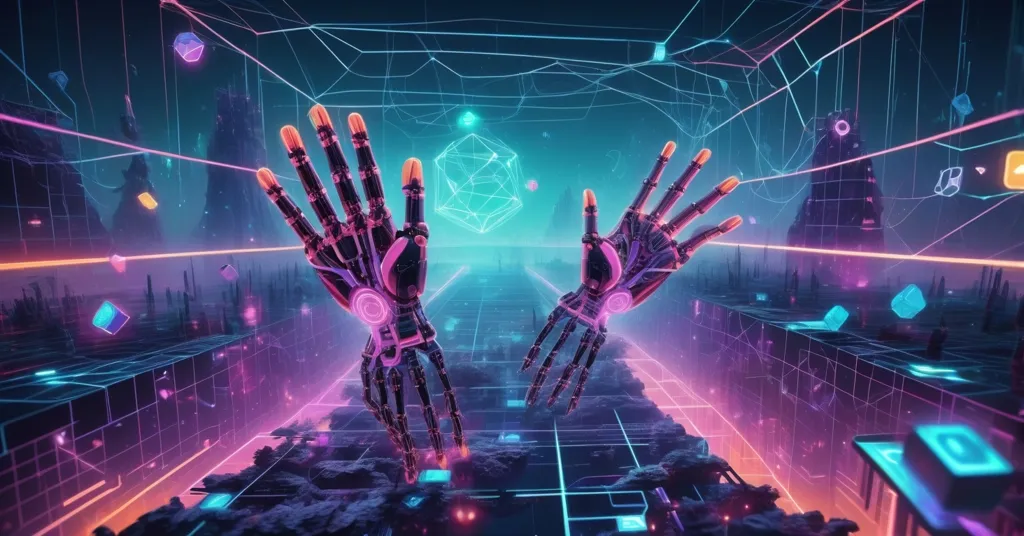EA and Krafton Bet Big on AI: Gaming Revolution or Risky Overreach with Crypto Potential?

Game Giants EA and Krafton Go All-In on AI: Revolution or Risk for Gaming and Crypto?
Two of the gaming industry’s biggest names, Electronic Arts (EA) and Krafton, are staking their futures on generative artificial intelligence (AI), betting it will transform how games are made and cement their dominance in a fiercely competitive market. But as they push boundaries, questions loom about creative control, financial risk, and whether this tech wave could ripple into blockchain and crypto spaces.
- EA teams up with Stability AI for cutting-edge game design tools.
- Krafton aims for a complete AI-first overhaul by 2026 with staggering investments.
- AI’s role in gaming could intersect with blockchain for decentralized innovation.
EA’s AI Ambition: Empowering Creators or Cutting Corners?
Electronic Arts, a titan in the gaming world with powerhouse franchises like EA Sports FC, Battlefield, and Madden NFL, has forged a strategic alliance with Stability AI, the innovators behind the Stable Diffusion model. Their mission is to develop AI tools that streamline game creation, specifically focusing on physically based rendering (PBR) materials and pre-visualizing 3D environments from text prompts. For those new to the jargon, PBR is a technique that makes game graphics look as lifelike as a blockbuster movie by simulating how light interacts with surfaces—think the shimmer of armor in Battlefield or the grit of a football field in Madden. Pre-visualization, on the other hand, is like drafting a quick blueprint of a game world before pouring in the hours to build it, potentially saving massive time and resources.
Kallol Mitra, VP of Creative Innovation at EA, framed this partnership as a creative game-changer:
“Creativity has always been at the heart of everything our teams do. Together with Stability AI, we’re amplifying that creativity. Giving artists, designers, and developers the power to dream bigger and build more.”
That sounds inspiring, but let’s cut through the glossy PR. While EA insists artists will stay in control, using AI as a tool rather than a replacement, there’s a nagging doubt: how long before algorithms start nudging out human quirks that make games feel alive? Gamers, who are notoriously vocal, will be quick to call out any whiff of soulless, AI-generated content. On the flip side, if done right, this could empower smaller teams or indie devs to punch above their weight, aligning with the disruptive ethos we champion. For now, it’s a tightrope walk between innovation and overreach.
Krafton’s Bold Leap: Visionary AI Push or Financial Folly?
Meanwhile, Krafton, the force behind global hits like PUBG and Subnautica, isn’t just experimenting with AI—they’re going all-in to become an AI-first company by 2026. CEO Kim Chang-han laid out a sweeping vision for this shift:
“We will leap forward as a company that promotes the growth of members and expands the organization’s areas of challenge through AI.”
Behind the corporate-speak, Krafton’s plan is staggering in scope and cost. They’re investing a mind-boggling $70 billion into GPU cluster infrastructure—think giant server farms crunching data to power AI reasoning tasks. Starting in 2026, they’ll also shell out $21 billion annually on AI tools for employees, a figure over ten times their current spend. That’s the kind of number that makes even Bitcoin whales pause. Their timeline targets a fully integrated AI platform by late 2025, with the total transformation complete a year later. Central to this is agentic AI, which isn’t just a passive tool—it’s like a virtual assistant that thinks and acts independently, potentially designing entire game levels or troubleshooting code without human input. For more details on their ambitious pivot to AI, check out this report on EA and Krafton’s commitment to AI technology.
Ambitious? Hell yes. Reckless? Possibly. If AI doesn’t deliver the promised efficiency or if gamers reject overly automated experiences, Krafton could face a financial bloodbath. Worse, over-reliance on algorithms risks stripping away the raw, human touch that defines gaming’s best moments. Yet, there’s an upside: if successful, this could set a precedent for tech-driven disruption, showing how bold bets on innovation—much like Bitcoin’s early days—can redefine an industry.
The Bigger Picture: AI as a Competitive Edge and a Risk
The moves by EA and Krafton aren’t isolated experiments; they signal a broader trend in the global gaming market where AI is becoming a must-have to stay competitive. Faster development cycles, hyper-realistic worlds, and slashed costs are the shiny promises. But let’s not drink the Kool-Aid just yet. If AI churns out cookie-cutter games that bore players to tears, it could backfire spectacularly. And for Krafton, with billions on the line, a tech flop isn’t just a hiccup—it’s a potential death knell. Even EA, with its more measured approach, isn’t immune to skepticism about whether AI will truly enhance creativity or just streamline mediocrity.
Then there’s EA’s other headache: a $55 billion acquisition deal with a consortium including Saudi Arabia’s Public Investment Fund, Silver Lake, and Affinity Partners. This has sparked fierce criticism over potential debt burdens and national security concerns tied to foreign influence in a culturally pivotal industry like gaming. Gamers aren’t shy about slamming corporate overreach, and public backlash—or worse, regulatory roadblocks—could distract EA from its AI push. It’s a messy backdrop that might taint even the most innovative tech rollouts.
AI Meets Blockchain: A Crypto Gaming Revolution in Waiting?
For those of us obsessed with decentralization and disruptive tech, the real intrigue lies in how AI in gaming could intersect with blockchain and crypto. Neither EA nor Krafton has mentioned blockchain explicitly, but the potential is tantalizing. Picture this: AI-generated game assets—unique characters, weapons, or skins in PUBG or Battlefield—minted as NFTs on Ethereum, giving players true digital ownership to trade or sell. Or imagine Bitcoin’s Lightning Network enabling instant, low-fee microtransactions for in-game purchases, cutting out middlemen and aligning with the freedom and privacy we hold dear.
Platforms like The Sandbox and Decentraland already showcase blockchain gaming’s promise, where user-owned assets and decentralized ecosystems thrive. Pair that with AI’s ability to create dynamic, personalized content, and you’ve got a recipe for accelerating crypto adoption in mainstream gaming. But let’s play devil’s advocate: if AI and NFT integrations just become another 2021-style scam fest with rug pulls and overhyped junk, it’ll sour gamers on both technologies. And scalability remains a beast—Ethereum’s gas fees or network congestion could choke any AI-driven NFT boom unless layer-2 solutions step up. Still, as champions of effective accelerationism, we see this crossover as a potential turbo boost for decentralized innovation if executed with integrity.
Bitcoin maximalists might scoff at altcoin-heavy NFT chatter, and fair enough—Bitcoin’s purity as sound money doesn’t need gaming gimmicks. But even BTC could play a role here, perhaps as a backbone for secure, peer-to-peer in-game economies via Lightning. Meanwhile, Ethereum and other protocols fill niches Bitcoin shouldn’t, like complex smart contracts for AI-generated assets. It’s a messy, exciting space where gaming could become the killer app that drags crypto into the mainstream—or a cautionary tale of tech overreach.
AI in Gaming: Balancing Hype with Hard Truths
Let’s be real: EA and Krafton are playing a high-stakes game. Their AI bets could usher in a golden age of gaming creativity and efficiency, inspiring other industries—crypto included—to rethink what’s possible. But the pitfalls are glaring. Beyond creative and financial risks, there’s a philosophical clash. If AI centralizes design under proprietary algorithms owned by corporate giants, it could undermine the open, user-driven spirit of blockchain and decentralization we fight for. On the other hand, if AI tools empower indie devs or mesh with decentralized platforms, it could be a win for freedom and disruption over the status quo.
As for the corporate hype, let’s keep the bullshit detector on high. Krafton’s 2026 timeline feels like a sci-fi pipe dream given current AI limitations—call me skeptical, but tech rarely moves that fast without hiccups. EA’s promises of “dreaming bigger” sound nice, but gamers will judge the end product, not the press release. We’re rooting for innovation that uplifts rather than exploits, but history shows tech giants often prioritize profit over principle. The gaming community’s sharp critique will be the ultimate test.
Key Questions and Takeaways on AI, Gaming, and Crypto
- How are EA and Krafton using AI to transform game development?
EA is collaborating with Stability AI to build tools for realistic graphics and faster world-building, while Krafton is investing $70 billion in infrastructure and $21 billion yearly from 2026 to become fully AI-first. - What risks do these AI strategies pose for gaming giants?
Krafton’s massive spending could lead to financial ruin if AI underperforms, and both companies risk losing the human creativity gamers love if automation goes too far. - Could EA’s acquisition controversy derail its tech focus?
The $55 billion deal, tied to debt and foreign influence fears, might spark public or regulatory pushback, diverting attention and resources from AI innovation. - How might AI in gaming boost blockchain and crypto adoption?
AI-generated game assets could become NFTs on Ethereum for true ownership, while Bitcoin’s Lightning Network might power instant in-game payments, blending AI with decentralized tech. - Does AI in gaming align with decentralization and disruption?
If AI empowers indie creators and pairs with blockchain platforms, it could fuel decentralized innovation, but corporate-controlled AI risks clashing with the freedom and privacy crypto champions.
EA and Krafton are charging into uncharted territory with AI, echoing the kind of bold risks that birthed Bitcoin and blockchain’s rise. Whether they’re paving the way for a tech revolution or setting themselves up for a spectacular crash remains to be seen. For us, the hope is that this sparks a wave of empowerment—think indie devs leveraging AI on decentralized platforms, or gamers owning their AI-crafted assets via crypto. But if it’s just another corporate cash grab, we’ll be the first to call it out. The future of gaming, and maybe even crypto’s mainstream breakthrough, hangs in the balance. Keep your eyes peeled—this is one hell of a ride.



